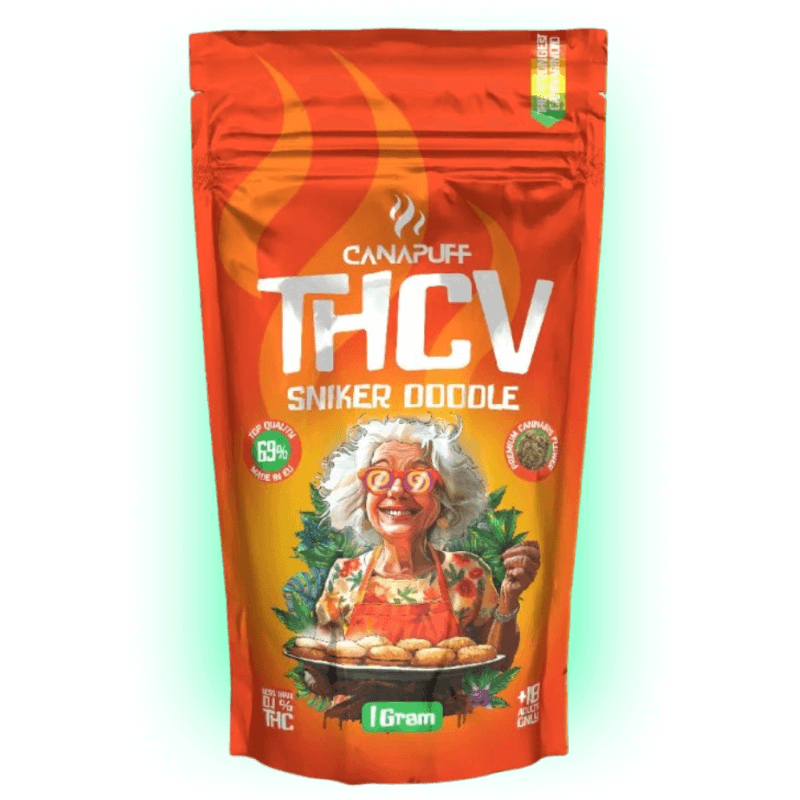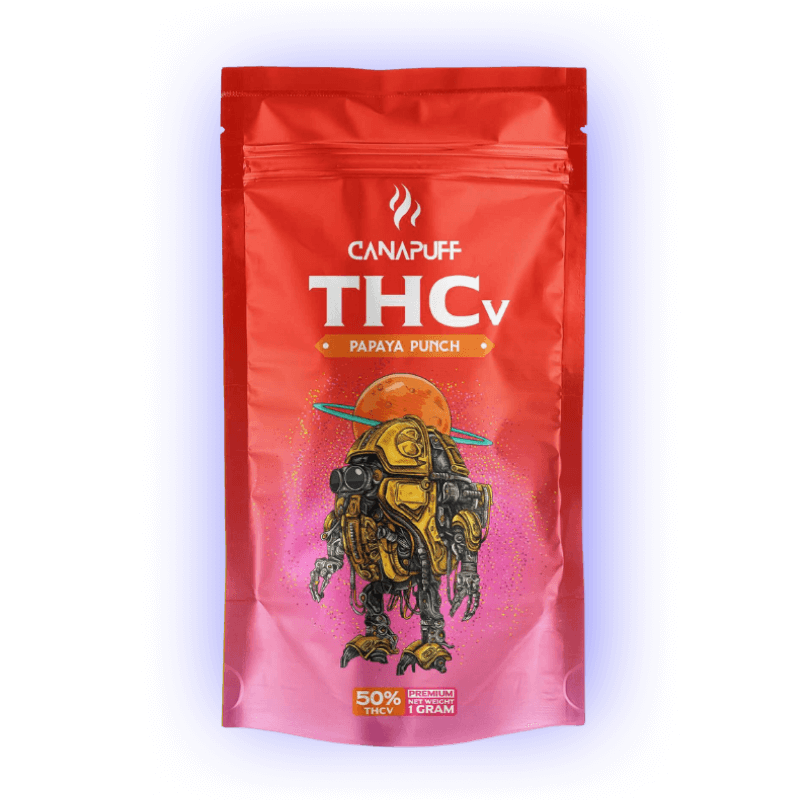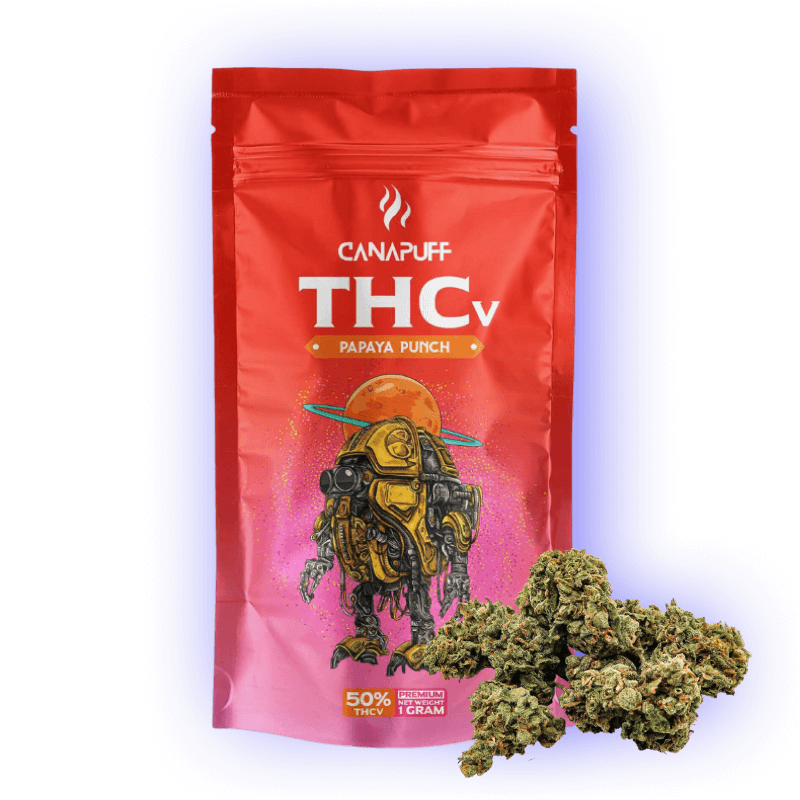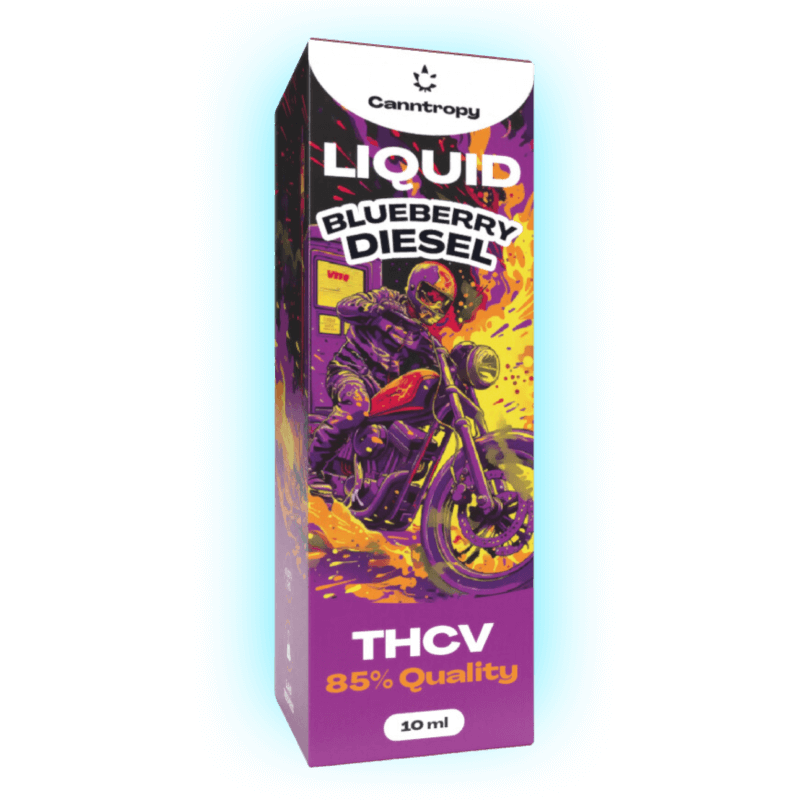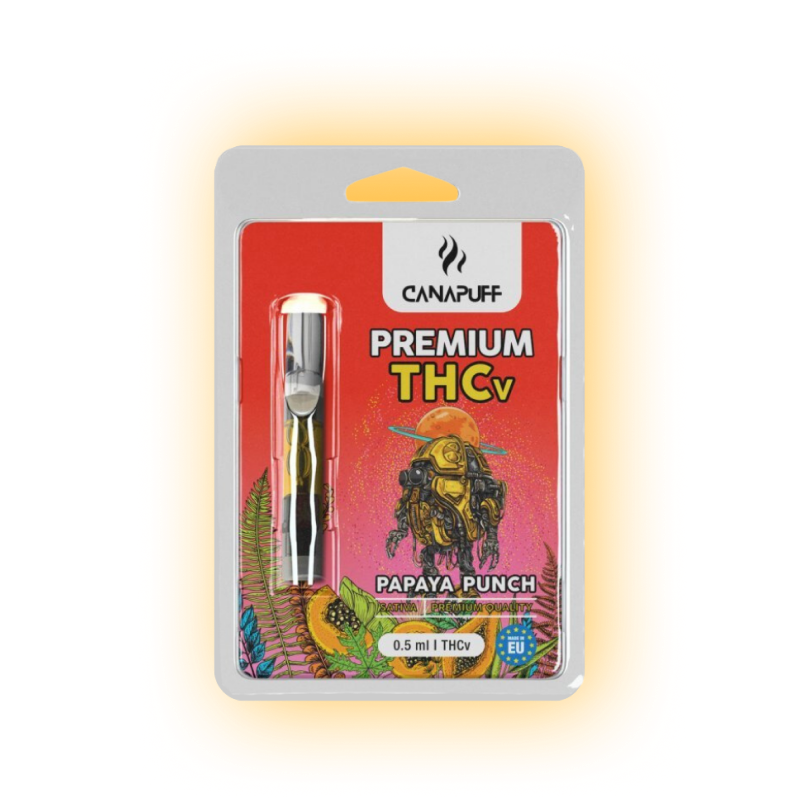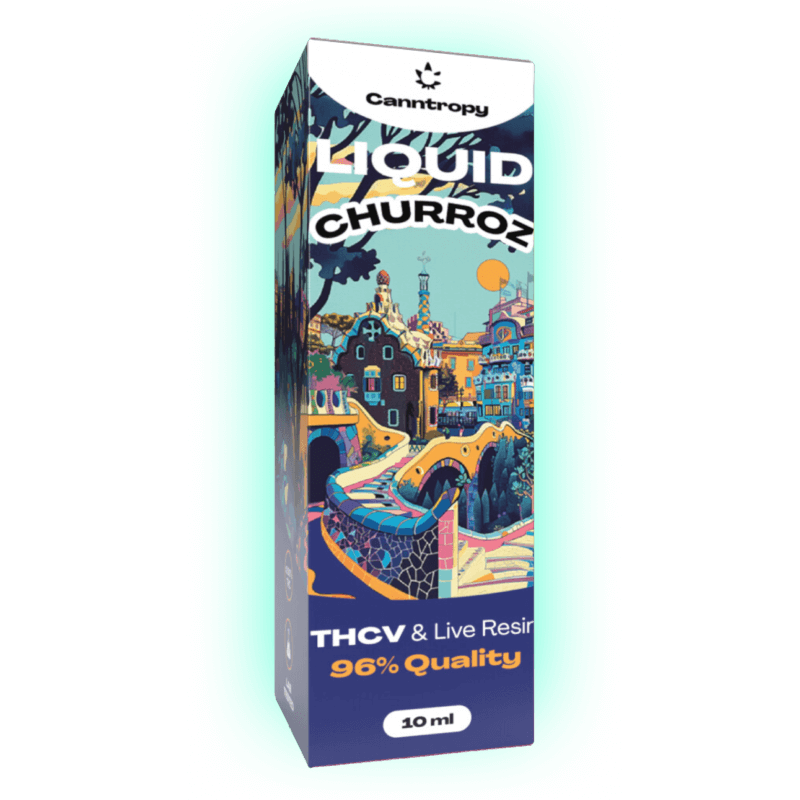Everything you need to know about THCV
THCV is one of over a hundred cannabinoids produced by the cannabis plant, and researchers are currently studying the molecule for potential therapeutic effects. Research is still in its infancy, but this small cannabinoid has already revealed some fascinating properties. Read on to find out more.
What is THCv?
THCV, or tetrahydrocannabivarin, is a close relative of THC, but due to slight differences in its chemical structure, it has a unique effect on the body. Researchers are particularly interested in this influence because THCV, along with other cannabinoids, could affect the endocannabinoid system. The only problem is that it is much more difficult to isolate THCV in larger quantities than other cannabinoids, making large-scale studies difficult.
To understand why isolation is so challenging, we need to look at the beginnings of the cannabinoid family tree.
All cannabinoids are derived from the precursor molecule CBGA and gradually become over a hundred different compounds through a series of chemical reactions. Of course, these cannabinoids do not appear at the same time or in the same quantities - therein lies the difficulty in isolating them.

THCV is produced in the early developmental stages of the hemp plant. A derivative of CBGA (CBGVA) reacts with enzymes and forms CBDVA, CBCVA and THCVA. After decarboxylation, THCVA loses a carboxyl group and becomes THCV. Although this process is similar to how we obtain important compounds such as CBD and THC, there is much less THCVA available to be converted into THCV.
Advantages of THCv
THCV, a cannabinoid derived from the cannabis plant, is gaining increasing attention for its potential health benefits. The following is an overview of the main effects of THCV that goes beyond the basic information and specifically addresses its potential therapeutic applications:
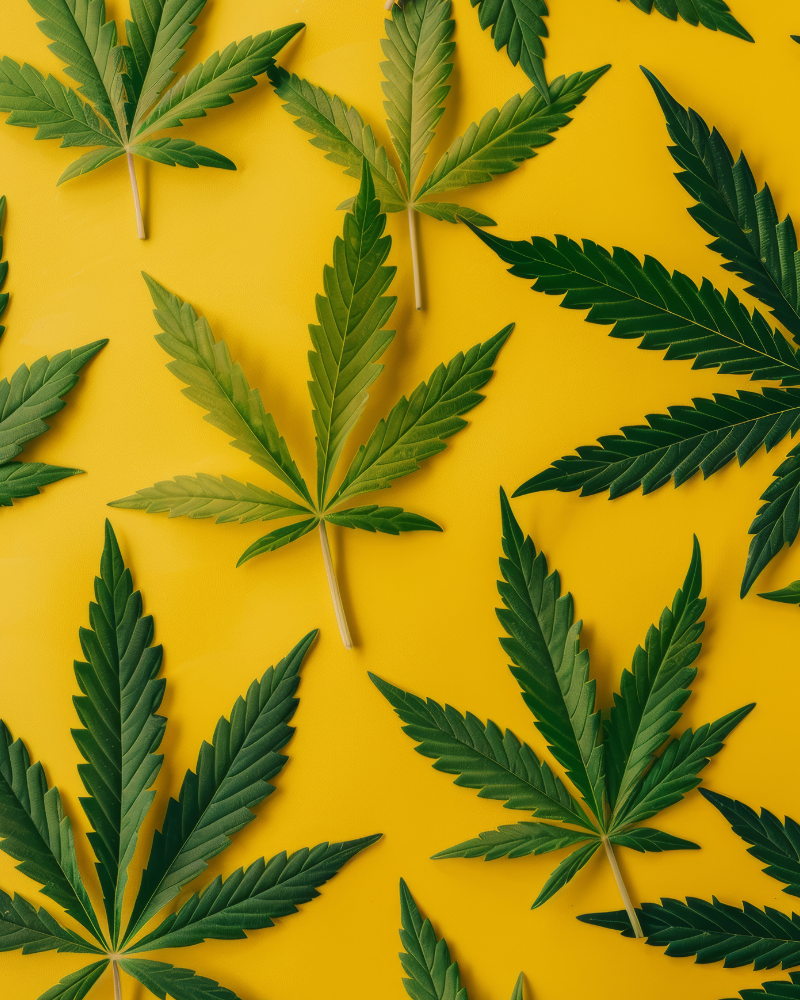
1. appetite control: THCV could play a key role in weight management therapy as it can effectively suppress appetite, unlike THC which increases appetite.
2. mental stability: Due to its antipsychotic properties, THCV is being researched as a potential agent for the treatment of conditions such as schizophrenia.
3. diabetes management: THCV's ability to regulate blood sugar levels could make it a valuable component in the treatment of diabetes.
4. anti-inflammatory effects: Its anti-inflammatory properties make THCV a potential option for the treatment of conditions associated with chronic inflammation, including certain types of pain.
5. neuroprotective properties: Research suggests that THCV may possess neuroprotective effects that could be helpful in the prevention and treatment of neurodegenerative diseases such as Alzheimer's and Parkinson's.
Effect of THCv
Tetrahydrocannabivarin (THCV) stands out among the cannabinoids due to its special mechanisms of action. THCV has an appetite suppressant effect by acting as an antagonist at CB1 receptors, which makes it interesting for the development of treatments against obesity.
In mental health, THCV shows neuroprotective & antipsychotic properties. It can help reduce psychotic symptoms and could be useful in the treatment of disorders such as schizophrenia. In addition, THCV shows potential in blood sugar regulation, making it a possible option for the therapy of diabetes.
THCV's anti-inflammatory properties could also make it a valuable component in the treatment of chronic inflammation and pain. Overall, THCV offers a number of promising effects that make it an interesting candidate for further medical research and application.

THCv experience
Users who have tried THCV often share interesting and slightly different experiences to those of traditional cannabinoids such as THC:
- Subtle psychoactivity: unlike THC, which has clear psychoactive effects, users of THCV often report a more subtle mental effect that does not affect their lucidity or daytime functioning.
- Mental stimulation: Some testimonials highlight that THCV not only keeps the mind alert, but can also increase creativity and mental agility, which is useful for cognitive tasks or creative endeavors.
- Feeling calm without sedation: Users appreciate that THCV can have a calming effect without making them feel tired or sedated, making it ideal for use during the day.
- Fast-acting effects and cooldown: Compared to other cannabinoids, some report a fast onset of THCV's effects, but they also wear off more quickly, making it appealing to users who don't want long-lasting effects.
- Positive influences on mood: In addition to appetite suppression and energy enhancement, there are also reports that THCV can improve mood and contribute to an overall sense of well-being.
These accounts illustrate how THCV can support its users in daily use, and they emphasize the diversity of its potential benefits.
THCv flowers
THCV flowers come from specially bred cannabis strains that are rich in tetrahydrocannabivarin (THCV). These strains are popular with young people who prefer a milder effect and don't want to get too high. THCV provides a clear, concentration-enhancing effect that is ideal for activities that require full attention. Additionally, THCV helps to curb appetite, which is great if you are watching your diet. The effects set in quickly and also wear off quickly - so you don't stay impaired all day.
THCV could also help with chronic pain and inflammation and may have neuroprotective properties. For young cannabis users looking for something new beyond the traditional THC strains, THCV flowers are an interesting option.

Discover the world of THCV flowers! Our customers love our selection:
🌟THCV Berry Gelato 50%Experience the refreshing effect of THCV with our Berry Gelato.
🌟THCV Papaya Punch 50%Get the exotic taste of papaya with a THCV content of 50%.
Dive into the world of THCV and discover the many possibilities these flowers offer!
THCV VS THCP
THCP (tetrahydrocannabiphorol) is considered one of the most potent cannabinoids that could be more potent than THC . It is less researched, but is believed to have a more intense psychoactive effect, possibly with stronger sedation.
In contrast, THCV (tetrahydrocannabivarin) is known for its appetite suppressant and stimulant effects. It can reduce appetite and promote mental clarity, making it particularly attractive for daytime use. Studies also show evidence of neuroprotective properties.
While THCP is attracting attention for its potential strength, THCV is valued for its specific health benefits. Both cannabinoids offer promising possibilities, but require further research to understand their full potential.
Side effects of THCv
As we still have limited knowledge of the effects of THCV in humans, the range of potential side effects of this cannabinoid is also unclear. However, the activation of CB1 receptors by THCv at very high doses could include some of the potential side effects of THC, such as anxiety, dry mouth, red eyes, memory loss, increased heart rate and slowed reaction time.
FAQs
Having briefly discussed the mode of action of THCV, it makes sense to delve deeper into how this substance works. As mentioned earlier, the effect of THCV on the endocannabinoid system (ECS) appears to be dose-dependent, meaning that a low dose has a different effect than a high dose.
Both THCV and THC are agonists of the CB1 receptors and increase their activity. However, at low doses, THCV can block CB1 receptors and inhibit the psychotropic effects of THC. In contrast, high doses appear to activate these receptors and produce a psychotropic effect[2].
THCV also appears to affect the CB2 receptors of the endocannabinoid system, which are associated with inflammation and other immune system functions.
Although common workplace drug tests do not usually look specifically for THCV, the close relationship of this substance to THC can lead to a positive test result. As specific THCV products are limited in availability, it is very likely that THCV ingestion occurs through the use of THC-rich cannabis, which can still have legal consequences in many regions of Europe and the US.
If the use of THC-containing products is not legally permitted in your area, it is advisable to avoid such products while scientists continue to work on advanced detection methods for THCV and other cannabinoids.
It is important to emphasize that the safety of THCV is still under evaluation. Although it is generally recognized that the effects of this cannabinoid are dose-dependent, there is still some risk of psychotropic effects, albeit to a lesser extent compared to its relative, THC. Despite its milder intoxicating effects, THCV appears to have a favorable safety profile. However, we should emphasize that further extensive studies in humans are needed.
In terms of safety, it is also important to consider the legal situation. Regarding the legal situation, THCV is in a kind of gray area. It is neither generally recognized nor explicitly banned, but due to its association with "marijuana extract" it is generally illegal.
THCV still hides many secrets, as research into cannabis is still in its infancy. Clearer insights into the effects of THCV will only be gained through clinical trials on humans. For now, we must rely on animal and cellular research for clues to the potential of this molecule.
As we still have limited knowledge of the effects of THCv in humans, the range of potential side effects of this cannabinoid is also unclear.
However, the activation of CB1 receptors by THCv at very high doses may include some of the known potential side effects of THC.
THCV flowers contain a higher proportion of THCV compared to other cannabis products. They therefore offer specific effects that are appreciated by users looking for a more subtle psychoactive experience.










